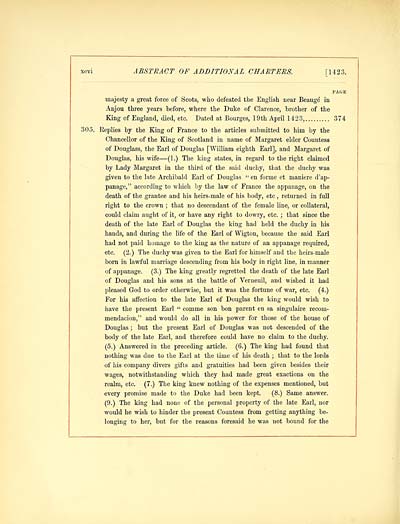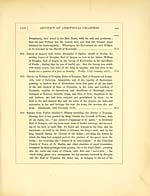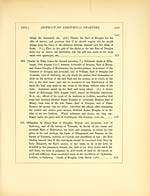Douglas book > Charters
(104) Page xcvi
Download files
Complete book:
Individual page:
Thumbnail gallery: Grid view | List view

xcvi ABSTRACT OF ADDITIONAL CHARTERS. [1423.
PAGE
majesty a great force of Scots, who defeated the English near Beauge" in
Anjou three years before, where the Duke of Clarence, brother of the
King of England, died, etc. Dated at Bourges, 1 9th April 1423, 374
305. Replies by the King of France to the articles submitted to him by the
Chancellor of the King of Scotland in name of Margaret elder Countess
of Douglass, the Earl of Douglas [William eighth Earl], and Margaret of
Douglas, his wife — (1.) The king states, in regard to the right claimed
by Lady Margaret in the third of the said duchy, that the duchy was
given to the late Archibald Earl of Douglas " en forme et maniere d'ap-
panage," according to which by the law of France the appanage, on the
death of the grantee and his heirs-male of his body, etc , returned in full
right to the crown ; that no descendant of the female line, or collateral,
could claim aught of it, or have any right to dowry, etc. ; that since the
death of the late Earl of Douglas the king had held the duchy in his
hands, and during the life of the Earl of Wigton, because the said Earl
had not paid homage to the king as the nature of an appanage required,
etc. (2.) The duchy was given to the Earl for himself and the heirs-male
born in lawful marriage descending from his body in right line, in manner
of appanage. (3.) The king greatly regretted the death of the late Earl
of Douglas and his sons at the battle of Verueuil, and wished it had
pleased God to order otherwise, but it was the fortune of war, etc. (4.)
For his affection to the late Earl of Douglas the king would wish to
have the present Earl " comme son bon parent eu sa singulaire reconi-
mendacion," and would do all in his power for those of the house of
Douglas ; but the present Earl of Douglas was not descended of the
body of the late Earl, and therefore could have no claim to the duchy.
(5.) Answered in the preceding article. (6.) The king had found that
nothing was due to the Earl at the time of his death ; that to the lords
of his company divers gifts and gratuities had been given besides their
wages, notwithstanding which they had made great exactions on the
realm, etc. (7.) The king knew nothing of the expenses mentioned, but
every promise made to the Duke had been kept. (8.) Same answer.
(9.) The king had none of the personal property of the late Earl, nor
would he wish to hinder the present Countess from getting anything be-
longing to her, but for the reasons foresaid he was not bound for the
PAGE
majesty a great force of Scots, who defeated the English near Beauge" in
Anjou three years before, where the Duke of Clarence, brother of the
King of England, died, etc. Dated at Bourges, 1 9th April 1423, 374
305. Replies by the King of France to the articles submitted to him by the
Chancellor of the King of Scotland in name of Margaret elder Countess
of Douglass, the Earl of Douglas [William eighth Earl], and Margaret of
Douglas, his wife — (1.) The king states, in regard to the right claimed
by Lady Margaret in the third of the said duchy, that the duchy was
given to the late Archibald Earl of Douglas " en forme et maniere d'ap-
panage," according to which by the law of France the appanage, on the
death of the grantee and his heirs-male of his body, etc , returned in full
right to the crown ; that no descendant of the female line, or collateral,
could claim aught of it, or have any right to dowry, etc. ; that since the
death of the late Earl of Douglas the king had held the duchy in his
hands, and during the life of the Earl of Wigton, because the said Earl
had not paid homage to the king as the nature of an appanage required,
etc. (2.) The duchy was given to the Earl for himself and the heirs-male
born in lawful marriage descending from his body in right line, in manner
of appanage. (3.) The king greatly regretted the death of the late Earl
of Douglas and his sons at the battle of Verueuil, and wished it had
pleased God to order otherwise, but it was the fortune of war, etc. (4.)
For his affection to the late Earl of Douglas the king would wish to
have the present Earl " comme son bon parent eu sa singulaire reconi-
mendacion," and would do all in his power for those of the house of
Douglas ; but the present Earl of Douglas was not descended of the
body of the late Earl, and therefore could have no claim to the duchy.
(5.) Answered in the preceding article. (6.) The king had found that
nothing was due to the Earl at the time of his death ; that to the lords
of his company divers gifts and gratuities had been given besides their
wages, notwithstanding which they had made great exactions on the
realm, etc. (7.) The king knew nothing of the expenses mentioned, but
every promise made to the Duke had been kept. (8.) Same answer.
(9.) The king had none of the personal property of the late Earl, nor
would he wish to hinder the present Countess from getting anything be-
longing to her, but for the reasons foresaid he was not bound for the
Set display mode to:
![]() Universal Viewer |
Universal Viewer | ![]() Mirador |
Large image | Transcription
Mirador |
Large image | Transcription
Images and transcriptions on this page, including medium image downloads, may be used under the Creative Commons Attribution 4.0 International Licence unless otherwise stated. ![]()
| Histories of Scottish families > Douglas book > Charters > (104) Page xcvi |
|---|
| Permanent URL | https://digital.nls.uk/96540942 |
|---|
| Attribution and copyright: |
|
|---|---|
| Description | A selection of almost 400 printed items relating to the history of Scottish families, mostly dating from the 19th and early 20th centuries. Includes memoirs, genealogies and clan histories, with a few produced by emigrant families. The earliest family history goes back to AD 916. |
|---|

